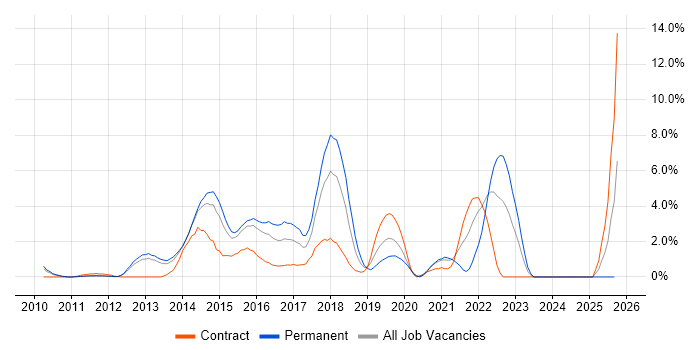NoSQL
Suffolk > Ipswich
The table below provides summary statistics and contractor rates for jobs advertised in Ipswich requiring NoSQL skills. It covers contract job vacancies from the 6 months leading up to 19 October 2025, with comparisons to the same periods in the previous two years.
| 6 months to 19 Oct 2025 |
Same period 2024 | Same period 2023 | |
|---|---|---|---|
| Rank | 9 | - | - |
| Rank change year-on-year | - | - | - |
| Contract jobs citing NoSQL | 3 | 0 | 0 |
| As % of all contract jobs in Ipswich | 7.50% | - | - |
| As % of the Database & Business Intelligence category | 50.00% | - | - |
| Number of daily rates quoted | 0 | 0 | 0 |
| Median daily rate (50th Percentile) | - | - | - |
| Suffolk median daily rate | - | - | - |
All Database and Business Intelligence Skills
Ipswich
NoSQL falls under the Databases and Business Intelligence category. For comparison with the information above, the following table provides summary statistics for all contract job vacancies requiring database or business intelligence skills in Ipswich.
| Contract vacancies with a requirement for database or business intelligence skills | 6 | 22 | 12 |
| As % of all contract IT jobs advertised in Ipswich | 15.00% | 46.81% | 12.12% |
| Number of daily rates quoted | 2 | 10 | 8 |
| 10th Percentile | - | £300 | £318 |
| 25th Percentile | - | £300 | £403 |
| Median daily rate (50th Percentile) | £500 | £375 | £563 |
| Median % change year-on-year | +33.33% | -33.33% | -12.62% |
| 75th Percentile | - | £388 | £700 |
| 90th Percentile | - | £408 | - |
| Suffolk median daily rate | £500 | £375 | £525 |
| % change year-on-year | +33.33% | -28.57% | -17.97% |
NoSQL
Job Vacancy Trend in Ipswich
Historical trend showing the proportion of contract IT job postings citing NoSQL relative to all contract IT jobs advertised in Ipswich.

NoSQL
Daily Rate Trend in Ipswich
Contractor daily rate distribution trend for jobs in Ipswich citing NoSQL.

NoSQL
Co-Occurring Skills & Capabilities in Ipswich by Category
The following tables expand on the one above by listing co-occurrences grouped by category. They cover the same employment type, locality and period, with up to 20 co-occurrences shown in each category:
